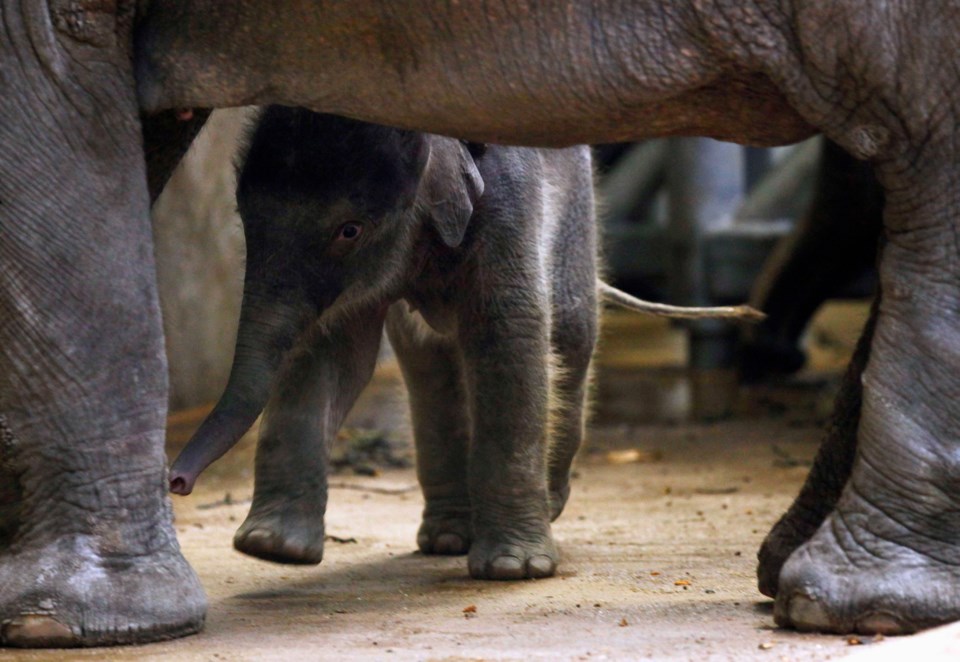Once upon a time, and not so long ago either, a million elephants roamed Earth. Last year, 25,000 elephants were slaughtered for their ivory, according to the harrowing — and important — National Geographic documentary Battle for the Elephants, made for PBS.
All across Africa, elephant populations have crashed — and in less time than the original Big Brother has been on the air. The carnage is on a horrific scale. It’s not just the well-trodden tourist parks of East Africa, either, but inside the park boundaries of remote pristine wildlife areas in less travelled countries like Cameroon, Gabon, Chad, Central African Republic and Democratic Republic of Congo, where it was assumed elephants and other wild animals might live out their lives in peace, unnoticed and undisturbed.
Instead, the filmmakers note, the insatiable appetite for ivory among China’s fast-growing middle and upper classes is fuelling demand and has led to wholesale slaughter. Where just a few years ago, elephants were counted in the tens of thousands, they now number in the hundreds — if that. It used to be that 40- to 50-year-old bull elephants were shot for their mature tusks, so large in some cases that the tusks reached the ground. Now, adolescent elephants, with tusks barely a metre long, are being gunned down in the name of the ivory trade. Where once poachers operated alone or in small groups with rifles and wire snares, they now work in concert with organized-crime syndicates and corrupt governments, in some cases mowing down entire herds of elephants from helicopters, spraying fire indiscriminately from AK-47 automatic assault rifles.
Why should we care?
Elephants are no ordinary animal, for one. Conservationists argue that if humankind can’t rally to save the elephant in the wild, then there’s not much point in trying to save any endangered species.
It’s a sobering thought, but Battle for the Elephants isn’t just a dirge, thankfully. A companion film to investigative journalist Bryan Christy’s cover story in the October 2012 issue of National Geographic, Battle for the Elephants does a wonderful job of explaining both the unique natural history and behaviour of wild elephants, from their complex matriarchal society to their long memories, their displays of empathy and an uncanny ability to recognize — and mourn — the remains of long-since deceased family members.
Battle for the Elephants is hard to watch at times, but also uplifting, sometimes when least expected. But it’s a must-see for anyone interested in conservation, anyone fortunate enough to have visited an African park and seen elephants in the wild, and anyone with children old enough to understand that elephants are real, that they have families of their own and mourn their dead. Documentaries may be a dime a dozen on public television these days, but Battle for the Elephants weighs in at the high end of the scale. There are moments here that are truly unforgettable. 9 p.m., PBS
Three to see:
• Toronto director Holly Dale, a Gemini winner for the unfairly overlooked Durham County, directed tonight’s episode of The Americans, in which a KGB informant buckles under the stress and threatens to put the entire operation in jeopardy, just days after Ronald Reagan was shot. 7 p.m., FX
• Big Brother Canada may not win points for originality, or anything else for that matter, but it is what it is. The first U.S. Big Brother aired in July 2000 — two weeks before the debut of the U.K. version — so viewers know exactly what to expect. 6 p.m., Slice; 9 p.m., Global
• Survivor beat Big Brother to the air by five weeks back in the year 2000, which makes it the true granddaddy of reality shows. And it’s still surviving. Alliances shift! Unrest ensues! And time marches on. 8 p.m., Global, CBS



